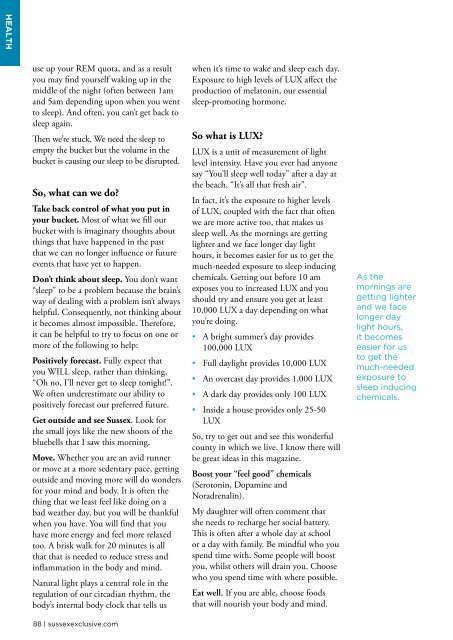Sussex Exclusive Magazine. Issue 7
A delightful dive into the very best Sussex has to offer. Enjoy 48 hours in Chichester and Rother exploring vineyards, castles and Medieval towns, try fantastic local cuisine and foodie experiences, discover ancient bluebell woods and wild garlic, learn the best places to go bargain hunting or visit one of the county's legendary landmarks. From the weird and the wonderful to the sublime and luxury, enjoy 96 pages about one of the most beautiful and bountiful county's in England.
A delightful dive into the very best Sussex has to offer. Enjoy 48 hours in Chichester and Rother exploring vineyards, castles and Medieval towns, try fantastic local cuisine and foodie experiences, discover ancient bluebell woods and wild garlic, learn the best places to go bargain hunting or visit one of the county's legendary landmarks. From the weird and the wonderful to the sublime and luxury, enjoy 96 pages about one of the most beautiful and bountiful county's in England.
You also want an ePaper? Increase the reach of your titles
YUMPU automatically turns print PDFs into web optimized ePapers that Google loves.
HEALTH<br />
HEALTH<br />
use up your REM quota, and as a result<br />
you may find yourself waking up in the<br />
middle of the night (often between 1am<br />
and 5am depending upon when you went<br />
to sleep). And often, you can’t get back to<br />
sleep again.<br />
Then we’re stuck. We need the sleep to<br />
empty the bucket but the volume in the<br />
bucket is causing our sleep to be disrupted.<br />
So, what can we do?<br />
Take back control of what you put in<br />
your bucket. Most of what we fill our<br />
bucket with is imaginary thoughts about<br />
things that have happened in the past<br />
that we can no longer influence or future<br />
events that have yet to happen.<br />
Don’t think about sleep. You don’t want<br />
“sleep” to be a problem because the brain’s<br />
way of dealing with a problem isn’t always<br />
helpful. Consequently, not thinking about<br />
it becomes almost impossible. Therefore,<br />
it can be helpful to try to focus on one or<br />
more of the following to help:<br />
Positively forecast. Fully expect that<br />
you WILL sleep, rather than thinking,<br />
“Oh no, I’ll never get to sleep tonight!”.<br />
We often underestimate our ability to<br />
positively forecast our preferred future.<br />
Get outside and see <strong>Sussex</strong>. Look for<br />
the small joys like the new shoots of the<br />
bluebells that I saw this morning.<br />
Move. Whether you are an avid runner<br />
or move at a more sedentary pace, getting<br />
outside and moving more will do wonders<br />
for your mind and body. It is often the<br />
thing that we least feel like doing on a<br />
bad weather day, but you will be thankful<br />
when you have. You will find that you<br />
have more energy and feel more relaxed<br />
too. A brisk walk for 20 minutes is all<br />
that that is needed to reduce stress and<br />
inflammation in the body and mind.<br />
Natural light plays a central role in the<br />
regulation of our circadian rhythm, the<br />
body’s internal body clock that tells us<br />
when it’s time to wake and sleep each day.<br />
Exposure to high levels of LUX affect the<br />
production of melatonin, our essential<br />
sleep-promoting hormone.<br />
So what is LUX?<br />
LUX is a unit of measurement of light<br />
level intensity. Have you ever had anyone<br />
say “You’ll sleep well today” after a day at<br />
the beach, “It’s all that fresh air”.<br />
In fact, it’s the exposure to higher levels<br />
of LUX, coupled with the fact that often<br />
we are more active too, that makes us<br />
sleep well. As the mornings are getting<br />
lighter and we face longer day light<br />
hours, it becomes easier for us to get the<br />
much-needed exposure to sleep inducing<br />
chemicals. Getting out before 10 am<br />
exposes you to increased LUX and you<br />
should try and ensure you get at least<br />
10,000 LUX a day depending on what<br />
you’re doing.<br />
• A bright summer’s day provides<br />
100,000 LUX<br />
• Full daylight provides 10,000 LUX<br />
• An overcast day provides 1,000 LUX<br />
• A dark day provides only 100 LUX<br />
• Inside a house provides only 25-50<br />
LUX<br />
So, try to get out and see this wonderful<br />
county in which we live. I know there will<br />
be great ideas in this magazine.<br />
Boost your “feel good” chemicals<br />
(Serotonin, Dopamine and<br />
Noradrenalin).<br />
My daughter will often comment that<br />
she needs to recharge her social battery.<br />
This is often after a whole day at school<br />
or a day with family. Be mindful who you<br />
spend time with. Some people will boost<br />
you, whilst others will drain you. Choose<br />
who you spend time with where possible.<br />
Eat well. If you are able, choose foods<br />
that will nourish your body and mind.<br />
As the<br />
mornings are<br />
getting lighter<br />
and we face<br />
longer day<br />
light hours,<br />
it becomes<br />
easier for us<br />
to get the<br />
much-needed<br />
exposure to<br />
sleep inducing<br />
chemicals.<br />
This means choosing foods that are not<br />
only high in nutrients, but that you enjoy<br />
eating too.<br />
Relax. Introduce time to relax during<br />
the day. Truly switch off. Whether it be<br />
listening to some music, doing some<br />
exercise, reading a book … try to do more<br />
of what you enjoy doing.<br />
When we are relaxed, we can think<br />
clearly, and feel in control of our thoughts<br />
and our actions. When we relax the brain<br />
switches to a low resonance of Theta<br />
waves which allow us to process emotions,<br />
relieve stress and solve problems. I listen<br />
to a guided meditation most nights to<br />
support and improve the quality of my<br />
sleep, but I also practice breath work and<br />
yoga on a regular basis too. Relaxation<br />
doesn’t have to mean lying still and<br />
thinking of nothing; it can be doing the<br />
things that you enjoy.<br />
If you are a chronic insomniac, it’s always<br />
worth telling your GP, just so any medical<br />
conditions can be eliminated. If you just<br />
can’t seem to make improvement, then<br />
you may like to consider finding a good<br />
hypnotherapist or *CBTi specialist. They<br />
will help you to change the subconscious<br />
responses that keep your bucket full and<br />
look at supporting better sleep hygiene.<br />
Once you have your bucket under control<br />
(and hypnosis emulates REM so we have<br />
extra bucket emptying power that we can<br />
use too) you will find that things start to<br />
improve; often quite quickly.<br />
Life is so much better after a good night’s<br />
sleep. You will have a spring in your step<br />
and be able to look forward to the longer<br />
days of daylight ahead.<br />
*Cognitive Behavioural Therapy for Insomnia<br />
(CBTi) has evolved over the last 40 years<br />
into the most widely respected and highly<br />
regarded treatment for insomnia across the<br />
developed world. The National Institute for<br />
Health and Care Excellence (NICE) in the UK<br />
recommend CBTi as the first-line treatment for<br />
the management of insomnia. The personalised<br />
treatment provided to each client is specific<br />
to them, avoiding unwarranted treatment and<br />
focusing only on the factors relevant to the<br />
client. As such, the programme is more likely to<br />
improve adherence and compliance. It is also<br />
less cumbersome in terms of delivery, making the<br />
approach more efficient and cost-effective than<br />
previous first-generation CBTi.<br />
Holly Stone is<br />
an experienced<br />
Solution<br />
Focused Clinical<br />
Hypnotherapist,<br />
Supervisor and<br />
Senior Lecturer<br />
for CPHT<br />
Surrey with a<br />
special interest<br />
in supporting<br />
those with<br />
Eating Disorders<br />
and poor<br />
relationships with<br />
food. You can<br />
find out more<br />
about her here:<br />
Holly Stone<br />
Hypnotherapy<br />
88 | sussexexclusive.com<br />
89










